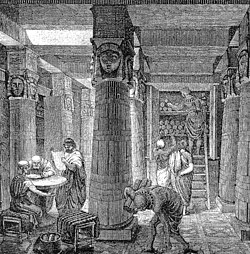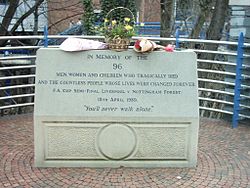Portal:History
The History Portal
History is the systematic study of the past, focusing primarily on the human past. As an academic discipline, it analyzes and interprets evidence to construct narratives about what happened and explain why it happened. Some theorists categorize history as a social science, while others see it as part of the humanities or consider it a hybrid discipline. Similar debates surround the purpose of history—for example, whether its main aim is theoretical, to uncover the truth, or practical, to learn lessons from the past. In a more general sense, the term history refers not to an academic field but to the past itself, times in the past, or to individual texts about the past.
Historical research relies on primary and secondary sources to reconstruct past events and validate interpretations. Source criticism is used to evaluate these sources, assessing their authenticity, content, and reliability. Historians integrate the perspectives of several individual sources to develop a coherent narrative. Different schools of thought, such as positivism, the Annales school, Marxism, and postmodernism, have distinct methodological approaches.
History is a broad discipline encompassing many branches. Some focus on specific time periods, such as ancient history, while others concentrate on particular geographic regions, such as the history of Africa. Thematic categorizations include political history, military history, social history, and economic history. Branches associated with specific research methods and sources include quantitative history, comparative history, and oral history.
History emerged as a field of inquiry in antiquity to replace myth-infused narratives, with influential early traditions originating in Greece, China, and later in the Islamic world. Historical writing evolved throughout the ages and became increasingly professional, particularly during the 19th century, when a rigorous methodology and various academic institutions were established. History is related to many fields, including historiography, philosophy, education, and politics. (Full article...)
Featured picture
Did you know (auto generated)

- ... that historically, native mercury was extracted from rocks mined in Idrija by washing them in the stream Nikova?
- ... that much of the research in dress history has been done from documents, illustrations, and photographs rather than by studying items of clothing?
- ... that The Catch II game had "one of the most amazing finishes in NFL postseason history", according to the NFL?
- ... that the historic water stream Seil Amman was roofed to make way for a road in the 1960s?
- ... that Montenegrin historian Radoje Pajović refused to engage in historical revisionism to rehabilitate Chetniks who collaborated with the Axis powers?
- ... that the historical lands and fishing grounds of the Skinpah were buried underwater by the construction of The Dalles Dam?
Sulayman ibn Abd al-Malik ibn Marwan (Arabic: سُلَيْمَان ٱبْن عَبْد الْمَلِك ٱبْن مَرْوَان, romanized: Sulaymān ibn ʿAbd al-Malik ibn Marwān, c. 675 – 24 September 717) was the seventh Umayyad caliph, ruling from 715 until his death. He was the son of Caliph Abd al-Malik ibn Marwan (r. 685–705) and Wallada bint al-Abbas. He began his career as governor of Palestine, while his father Abd al-Malik (r. 685–705) and brother al-Walid I (r. 705–715) reigned as caliphs. There, the theologian Raja ibn Haywa al-Kindi mentored him, and he forged close ties with Yazid ibn al-Muhallab, a major opponent of al-Hajjaj ibn Yusuf, al-Walid's powerful viceroy of Iraq and the eastern Caliphate. Sulayman resented al-Hajjaj's influence over his brother. As governor, Sulayman founded the city of Ramla and built the White Mosque in it. The new city superseded Lydda as the district capital of Palestine. Lydda was at least partly destroyed and its inhabitants may have been forcibly relocated to Ramla, which developed into an economic hub, became home to many Muslim scholars, and remained the commercial and administrative center of Palestine until the 11th century.
After acceding as caliph, Sulayman dismissed his predecessor's governors and generals. Many had been handpicked by al-Hajjaj and had led the war efforts which brought the Caliphate to its greatest territorial extent. Among them were the conqueror of Transoxiana (Central Asia), Qutayba ibn Muslim, who was killed by his own troops in an abortive revolt in anticipation of his dismissal, and the conqueror of Sind (the western Indian subcontinent), Muhammad ibn al-Qasim, who was executed. In the west, Sulayman deposed Musa ibn Nusayr, the conqueror of the Iberian Peninsula (al-Andalus) and governor of Ifriqiya (central North Africa), and had his son Abd al-Aziz, governor of al-Andalus, assassinated. Although he continued his predecessors' militarist policies, expansion largely stopped under Sulayman, partly due to effective resistance along the Central Asian frontiers and the collapse of Arab military leadership and organization there after Qutayba's death. Sulayman's appointee over the eastern Caliphate, his confidant Yazid, invaded the southern Caspian coast in 716, but withdrew and settled for a tributary arrangement after being defeated by the local Iranian rulers. Sulayman intensified the war with the Byzantine Empire, the primary focus of his war efforts, culminating in the 717–718 siege of Constantinople, which ended in a disastrous Arab defeat. (Full article...)
On this day
April 15: Day of the Sun in North Korea; Jackie Robinson Day and Tax Day in the United States
- 1632 – Thirty Years' War: A Swedish–German army defeated the forces of the Catholic League at the Battle of Rain, mortally wounding their commander Johann Tserclaes, Count of Tilly.
- 1923 – Ten Japanese-American children were killed in a racially motivated arson attack on a school in Sacramento, California.
- 1936 – Two Jews were killed near Tulkarm in Mandatory Palestine, an act widely viewed as the beginning of violence within the Arab revolt.
- 1989 – The Hillsborough disaster (memorial pictured), a human crush that caused 97 deaths in the worst disaster in British sporting history, occurred during an FA Cup match between Liverpool and Nottingham Forest in Sheffield.
- 2019 – A fire severely damaged Notre-Dame de Paris, destroying the cathedral's timber spire and much of the roof.
- Leonardo da Vinci (b. 1452)
- Nikita Khrushchev (b. 1894)
- Claudia Cardinale (b. 1938)
- Emma Watson (b. 1990)
Selected quote
In truth history does not belong to us but rather we to history.
— Hans-Georg Gadamer, German philosopher
Related portals
More Did you know...
- ... that the underground Fortress of Mimoyecques (pictured) was built by Nazi Germany to bombard London with 10 shells a minute using the V-3 supergun?
- ... that Howard P. Perry was the first African American recruit in the United States Marine Corps?
- ... that the Chester city walls form the most complete circuit of Roman and medieval defensive town walls in Britain?
- ... that China's first female director was adopted by the first Premier of the People's Republic of China?
- ... that the Medieval Merchant's House in Southampton was being used as a brothel when bomb damage during the Blitz revealed the building's important medieval architecture?
- ... that the Sumerian "river of paradise", the Hubur, derived partly from real geography before becoming a demonic fantasy?
- ... that Bill Foley's photograph "The Last Smile" shows Anwar Sadat only moments before his assassination?
- ... that the 1911 Sarez earthquake triggered a huge landslide, forming the tallest dam in the world?
Topics
Categories

History • By period • By region • By topic • By ethnic group • Historiography • Archaeology • Books • Maps • Images • Magazines • Organizations • Fictional • Museums • Pseudohistory • Stubs • Timelines • Chronology • People • Wikipedia historians
WikiProjects
![]() WikiProject History •
Ancient Near East • Australian History • Classical Greece and Rome • Dacia • Former countries • History of Canada • Chinese history • European history • Heraldry and vexillology • Indian history • Jewish history • Medieval Scotland • Mesoamerica • Military history • Middle Ages • History of Science
WikiProject History •
Ancient Near East • Australian History • Classical Greece and Rome • Dacia • Former countries • History of Canada • Chinese history • European history • Heraldry and vexillology • Indian history • Jewish history • Medieval Scotland • Mesoamerica • Military history • Middle Ages • History of Science
WikiProject Time • Days of the Year • Years
WikiProject Biography • Composers • Political figures • Saints • United States Presidents
Things you can do
 |
Here are some tasks awaiting attention:
|
Associated Wikimedia
The following Wikimedia Foundation sister projects provide more on this subject:
-
Commons
Free media repository -
Wikibooks
Free textbooks and manuals -
Wikidata
Free knowledge base -
Wikinews
Free-content news -
Wikiquote
Collection of quotations -
Wikisource
Free-content library -
Wikiversity
Free learning tools -
Wiktionary
Dictionary and thesaurus























































